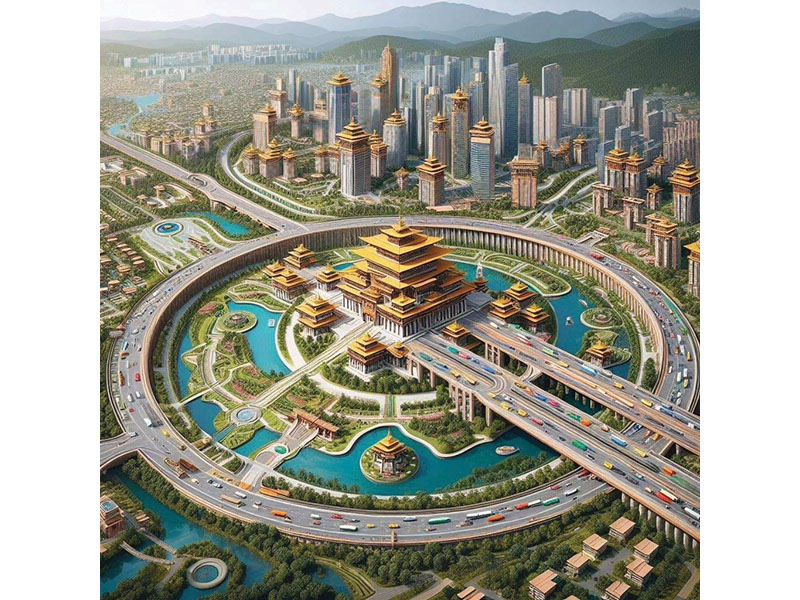Bhutan: New happiness curriculum
Special correspondent (Thimpu, Bhutan)
For introducing the metric of Gross National Happiness (GNH) as a counter to individually stressful and environmentally destructive national development metrics such as GNP (gross national product) and GDP (gross domestic product), the independent Himalayan Kingdom of Bhutan (pop.787,000) has attained global renown. In early October (1-3), a conference of the Bhutan Innovation Forum was convened in Dungkar Dzong in Pangbisa, Paro, to showcase the progress of Bhutan’s ambitious Gelephu Mindfulness City (GMC) that is assuming shape and form along Bhutan’s border with India, touching Assam.
According to a report in The Economist (October 17), when completed, GMC will “cover over 1,000 sq. km making it bigger than Singapore. Powered by hydro-energy, it is designed to house a million people including digital nomads, Buddhist pilgrims and wealthy expatriates”.
Against the backdrop of Bhutan having acquired a global reputation for conceptualising GNH as a national development metric, the important task of designing an aligned K-12 education system has been assigned to veteran educationist Arun Kapur, founding headmaster of Delhi’s Vasant Valley School (VVS, estb.1990), routinely ranked India’s #1 co-ed day school in the annual EducationWorld India School Rankings (EWISR).
After retiring from VVS, over the past decade Kapur has served as adviser to King Jigme Wangchuck and established Druk Gyalpo (royal) schools in all 23 districts of the kingdom which teach the sui generis Bhutan Baccalaureate programme. Drawing inspiration from the teachings of the kingdom’s much revered Guru Padmasambhava, which stress the importance of looking inward for primordial wisdom and inner awakening, the Bhutan Baccalaureate programme is being developed for global export.
“Although BBP comprises a rigorous evolving academic curriculum vetted and certified by the Advance Placements (USA) exam board, its unique feature is that it teaches children how to learn through sustained development of their cerebral, physical, emotional and social intelligences,” explains Kapur.
The highlight of the three-day Bhutan Innovation Forum was an enlightening panel discussion, moderated by Sheila Sarma of the SRS Family Foundation on the theme ‘Mainstreaming Mindfulness in Early Education’. The panelists were Kiran Bir Sethi, founder of top-ranked Riverside School, Ahmedabad; Deki Choden, Founding-Principal of Bhutan’s premier ELC High School, Thimpu; Alexis Harris, Director of the Compassionate School Project and Professor at the University of Virginia; Richa Gupta, Co-founder and CEO of Labhya, Delhi and Celina De Sola, Co-founder and President of Glasswing, El Salvador.
In the panel discussion, Deki Choden recounted problems with incorporating GNH mandated for implementation in all Bhutanese schools in 2010, into ELC’s classrooms because of the general perception that “mindfulness was for hermits”. But over the years, GNH principles have become well-established. “For instance, ELC has a mindfulness gong that is struck at regular intervals to remind students and teachers to take a pause, breathe, and quieten the chatter in their minds,” she said.
“Children also go on short mindfulness walks that provide a space for them to connect with nature and themselves,” she added. ELC has also partnered with Riverside School to implement the latter’s Design for Change programme being implemented in 60,000 schools worldwide.
Speaking anonymously on the sidelines of the three-day Bhutan Innovation Forum, Bhutan officials were unanimous that India (and Indian educationists in particular) enjoy enormous goodwill in Bhutan which geographically, is sandwiched between India and China. They warn that Chinese officials would dearly love to play a greater role in developing GMC which is envisaged to become an India-friendly global financial hub — like Hong Kong is for China. In the circumstances, Indian officials and educationists would be well-advised to tread carefully to ensure the unusual goodwill India enjoys in this tiny mountain kingdom is not blown.


















Add comment